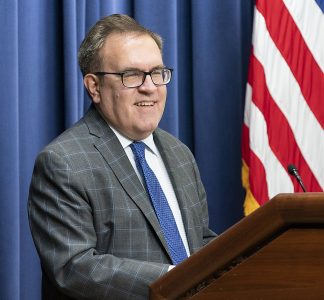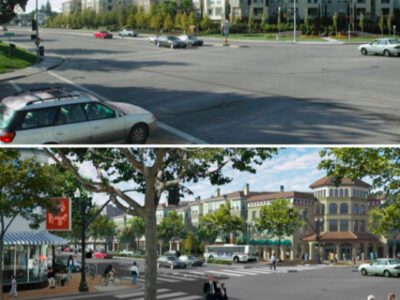While You Were Sleeping: Coronavirus Apparently Won’t Stop Trump Environmental Rollbacks
EPA May Roll Back Car Standards Next Week
 The New York Times is reporting that, despite the corona crisis and the shelter in place orders affecting people around the country, Andrew Wheeler is pressuring his EPA staff to release a finalized rule rolling back greenhouse gas emissions/fuel economy standards for cars. These EPA staff are for the most part working from home with all of the difficulties remote work — often with kids at home — creates. And yet it is somehow critical to the Trump Administration to eviscerate environmental rules during the worst pandemic in a a century.
The New York Times is reporting that, despite the corona crisis and the shelter in place orders affecting people around the country, Andrew Wheeler is pressuring his EPA staff to release a finalized rule rolling back greenhouse gas emissions/fuel economy standards for cars. These EPA staff are for the most part working from home with all of the difficulties remote work — often with kids at home — creates. And yet it is somehow critical to the Trump Administration to eviscerate environmental rules during the worst pandemic in a a century.
We do not know the final details of the rollback yet; the initial proposal was to freeze the standards at 2020 levels. Here is a description of the original rollback for details of how it worked. Reports are that — in part because the administrative record in support of a total freeze was so flawed — the rule will mandate very small increases in average fuel economy standards, around 1.5 percent, as opposed to freezing the rules all together. It is worth noting that automakers are claiming that they will achieve increases in fuel economy of about 2.4 percent annually without any regulation so for all intents and purposes the small increase is equivalent to or worse than no regulation.
So why the rush now on the roll back of the auto standards given the corona catastrophe facing the country? The reason for the pressure despite truly horrendous times is, apparently, an arcane and political one. Under the Congressional Review Act, Congress can repeal regulations within 60 days of adoption. The rule has to be submitted to Congress and cannot take effect for 60 days. In a sign that the Administration is anticipating a potential turnover of the Congress to Democrats, it is rushing to get a rule out before the November election.
But it is also the case that the longer the Administration delays the issuance of the car rule, the less effect the rollback has. Right now, auto manufacturers are operating under standards set by the Obama Administration that covered model years 2016-2025. Trump announced that he would roll back the standards early in his administration, in 2017, for model years 2020 and forward. The proposal to freeze the Obama standards at 2020 levels was issued in August, 2018. Here we are in March of 2020, with 2020 models already out and 2021 models already in the works. At best the new standards will affect 2022 models. And the “at best” assumes that things go smoothly in the implementation of the rules. But here are a few reasons to believe that things will not go so smoothly:
First, California has a separate settlement agreement with four automakers, who have committed to following the much tougher Obama standards with a few tweaks (these standards were issued jointly with California under its special authority to issue its own standards as long as it receives a waiver from the EPA to do so. The Trump Administration has, of course, revoked the waiver and California has sued in response). So about 30 percent of the auto market will just ignore the new Trump rules.
Second, the administrative record in support of the original proposal to freeze the standards was by detailed accounts a disaster. The biggest problem was that the math in support of the rationale just doesn’t work. The Trump Administration tried to argue that freezing the standards would save consumers money because they wouldn’t have to pay for new technology to make cars less carbon-intensive and more fuel efficient. But that isn’t true. The savings over the life of a car, in lower fuel costs, outweigh any upfront costs. That makes the legal case for rolling back the Obama standards really weak, even “arbitrary and capricious,” in legal speak. Recent reporting suggests that the weaknesses and problems in the administrative record haven’t disappeared even with the change from freezing the standards at 2020 levels to incorporate small annual rises. Rob Meyer of the Atlantic – now doing some of the best corona virus reporting around — has written two excellent articles detailing the problems with the math and the problems more generally with the unwillingness of the Trump Administration to work with and listen to the experts. The articles are here and here.
If the rules are issued next week as reporting suggests, here are a couple of things to watch for:
First, expect to see an immediate lawsuit filed arguing that the rollback violates the Clean Air Act and perhaps other statutes, including the Energy Policy and Conservation Act.
Second, it will be interesting to see if the states and environmental groups that sue seek a “stay” of the new rules that would ask the D.C. Circuit Court of Appeal to prevent the rules from going into effect pending the litigation. The legal grounds for doing so would be that the suing parties are likely to prevail on the merits; the practical effect would be to keep the Obama rules in effect indefinitely until the legal merits can be heard. A stay could affect what rules car makers follow for 2022 model year cars. If Trump loses in November, a stay would likely mean that the new rules never go into effect.
Third, does the economic fallout from the corona virus, combined with the Russia-Saudia Arabia oil fight, matter to the legal case if gas prices fall? Does new economic news change the math of the rules?
It may also be that the corona quarantine and resulting chaos makes it just too difficult to issue the new rules at this point. Despite confirmation from “a dozen EPA employees” that they face “relentless pressure” to issue the rules even as they are quarantined, and even with news that at least four EPA employees have tested positive for the virus, these are extraordinary times. The relentless pressure could face the stark reality that it simply isn’t possible to issue environmentally destructive policies while responding to an even more relentless virus.






Reader Comments